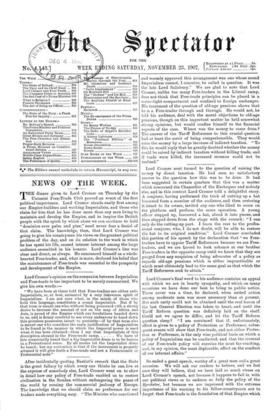After incidentally quoting Bastiat's remark that the State is the
great fallacy by which every one thinks he can live at the expense of somebody else, Lord Cromer went on to show in detail how our policy of Free-trade enabled us to restore civilisation in the Soudan without endangering the peace of the world by rousing the commercial jealousy of Europe. The knowledge that we should claim no preference for our traders made everything easy. " The Minister who sanctioned
and warmly approved this arrangement was one whose sound Imperialism cannot, I conceive, be called in question. It was the late Lord Salisbury." We are glad to note that Lord Cromer, unlike too many Free-traders in the Liberal camp, does not think that Free-trade principles can be place'd in a water-tight compartment and confined to foreign exchanges. His treatment of the question of old-age pensions shows that he is a Free-trader through and through. He would not, he told his audience, deal with the moral objections to old-age pensions, though on this important matter he held somewhat strong opinions, but would confine himself to the financial aspects of the case. Where was the money to come from ? The answer of the Tariff Reformers to this crucial question had at least the merit of being comprehensible. They would raise the money by a large increase of indirect taxation. " To this he would reply that he greatly doubted whether the money could be raised by indirect taxation without killing trade, and if trade were killed, the increased revenue could not be realised."


















































